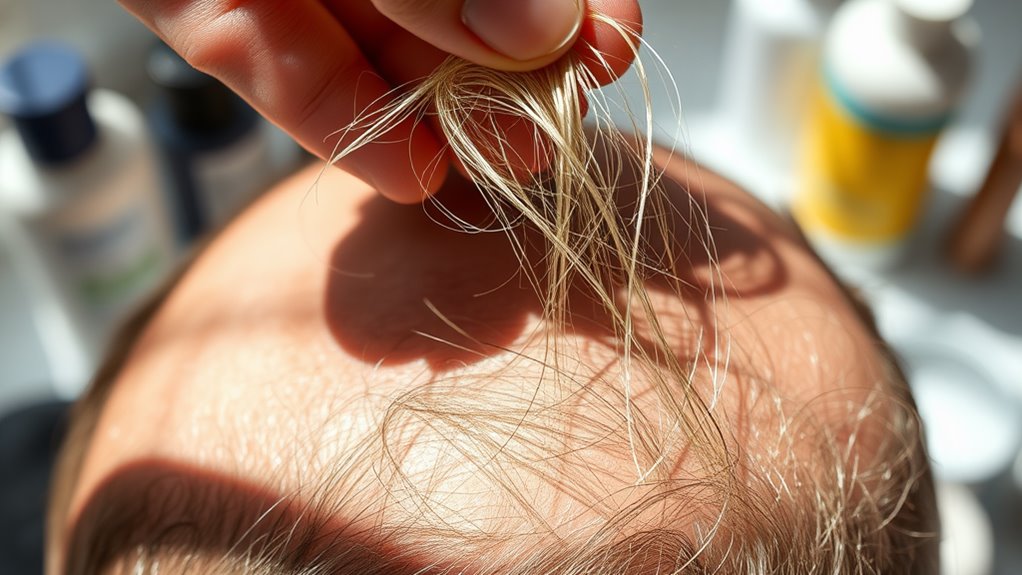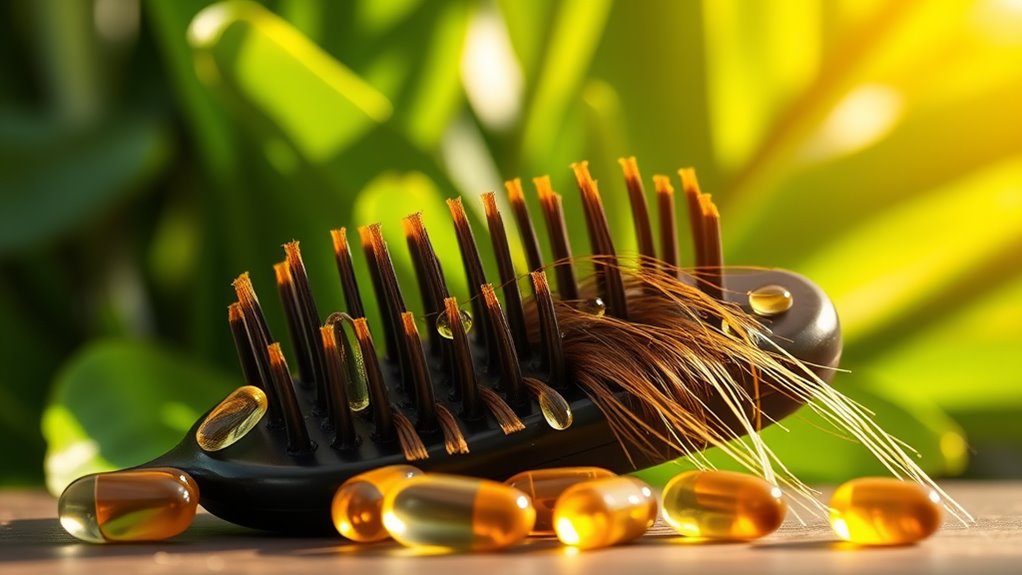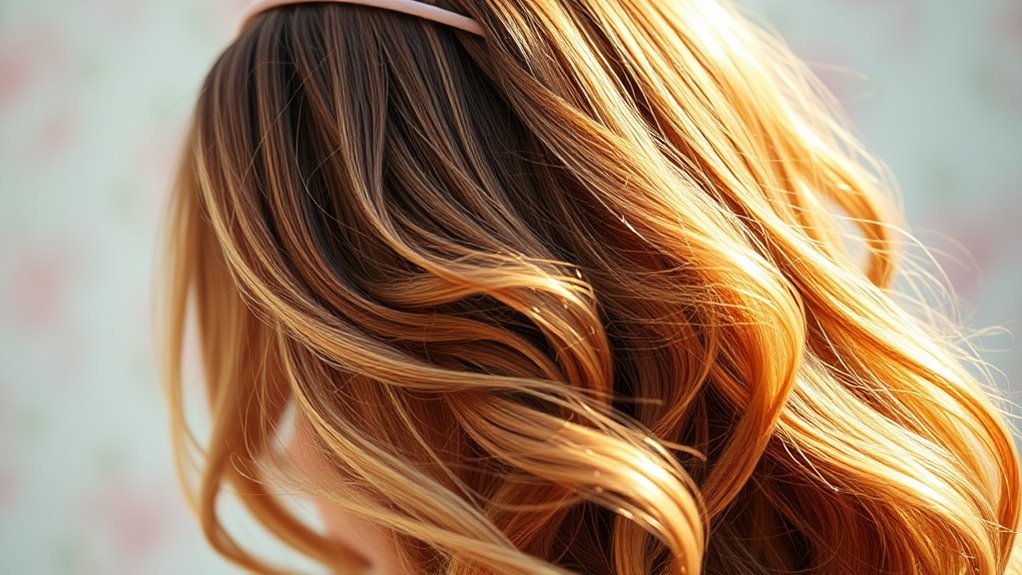Losing Hair Fast. This Could Be Why
If you’re losing hair fast, it could be due to various factors. Medical conditions like thyroid disorders or autoimmune diseases can disrupt hair growth. Stress also plays a significant role, releasing hormones that lead to increased shedding. Nutritional deficiencies, especially in biotin or iron, might be at fault too. Hormonal changes during puberty, pregnancy, or menopause can affect hair health. Plus, harsh hair products can worsen the problem. There’s more to explore on this topic.
Key Takeaways
- Thyroid disorders can disrupt hair growth cycles, leading to accelerated hair loss.
- Stress increases cortisol levels, which can trigger conditions like telogen effluvium and hair shedding.
- Nutritional deficiencies, particularly in biotin and iron, can stunt hair growth and contribute to thinning.
- Hormonal changes from puberty, pregnancy, or menopause can cause fluctuations that lead to hair loss.
- Harsh hair care products and over-styling can strip essential oils, resulting in dryness and increased breakage.
Medical Conditions That Contribute to Hair Loss
When it comes to hair loss, certain medical conditions can greatly contribute to the problem. You mightn’t realize that issues like thyroid disorders, autoimmune diseases, and hormonal imbalances can lead to increased hair fall.
Conditions such as alopecia areata trigger your immune system to attack hair follicles, resulting in noticeable patches of hair loss. Likewise, an underactive or overactive thyroid can disrupt your hair growth cycle, causing thinning or excessive shedding.
Additionally, polycystic ovary syndrome (PCOS) can result in hormonal fluctuations that contribute to hair fall in women. Recognizing these conditions is essential for addressing the underlying causes of your hair loss. Implementing proven herbal solutions and dietary modifications can also support hair health and mitigate loss.
Impact of Stress on Hair Health
Stress can greatly impact your hair health, often leading to increased shedding and thinning. When you’re stressed, your body releases hormones like cortisol, which can disrupt the hair growth cycle. This can result in conditions such as telogen effluvium, where hair follicles enter a resting phase prematurely.
Here’s a quick overview of how stress affects hair health:
| Stress Impact | Effect on Hair |
|---|---|
| Hormonal imbalance | Increased hair shedding |
| Disrupted growth cycle | Thinning hair |
| Inflammation | Hair follicle damage |
| Reduced nutrient absorption | Weakened hair structure |
| Psychological stress response | Hair loss |
Managing your stress through techniques like meditation, exercise, or therapy can help improve your hair health and overall well-being. Additionally, prolonged stress can lead to nutritional deficiencies, further exacerbating hair loss issues.
Nutritional Deficiencies Linked to Hair Thinning
Nutritional deficiencies can greatly contribute to hair thinning, especially if your diet lacks essential vitamins and minerals.
Key nutrients such as biotin, zinc, iron, and vitamins A, C, D, and E are essential for maintaining a healthy mane. When your body doesn’t get enough of these nutrients, hair follicles can weaken, leading to increased shedding.
For instance, insufficient iron can result in oxygen deprivation to hair cells, stunting growth. Biotin is important for keratin production, and a lack of it can cause brittle strands. Additionally, protein intake plays a crucial role in hair structure, and inadequate consumption can hinder growth.
To combat hair thinning, focus on a balanced diet rich in leafy greens, nuts, lean proteins, and whole grains.
Consider consulting a healthcare professional to assess your nutritional intake and make necessary adjustments.
Hormonal Changes and Their Effects on Hair
Hormones play a significant role in hair health and can lead to noticeable changes in your hair’s thickness and growth patterns.
When hormonal fluctuations occur, such as during puberty, pregnancy, or menopause, you might experience increased hair loss or thinning. Understanding these changes can empower you to take control of your hair health.
-
Androgens: Elevated levels can shrink hair follicles, leading to thinning.
-
Estrogen: This hormone typically promotes hair growth; its decline can result in shedding.
-
Thyroid Hormones: Imbalances can disrupt your hair’s growth cycle, causing hair loss.
Additionally, ensuring adequate intake of essential nutrients such as biotin and omega-3 fatty acids can further support healthy hair growth during these hormonal changes.
The Role of Hair Care Products and Treatments
While you mightn’t realize it, the hair care products and treatments you choose can considerably impact your hair’s health and growth. Ingredients matter—harsh chemicals in shampoos and conditioners can strip your hair of essential oils, leading to dryness and breakage.
Opt for sulfate-free formulas and nourishing oils that promote hydration. Treatments like leave-in conditioners or hair masks can help restore moisture and strengthen your strands, reducing hair loss. Additionally, consider the frequency of your product use; over-styling or excessive treatments can overwhelm your hair. Balance is key.
Tailor your routine to your hair type and needs, and always prioritize quality over quantity. Dietary changes and your choices today can pave the way for healthier, fuller hair tomorrow.
Lifestyle Choices That May Accelerate Hair Loss
Your daily habits can considerably influence the health of your hair, often in ways you mightn’t expect.
Certain lifestyle choices may accelerate hair loss, and recognizing them is essential for mastery over your hair’s condition.
Consider the following factors:
-
Poor diet: A lack of essential nutrients can hinder hair growth and liveliness.
-
High-stress levels: Chronic stress can trigger hair shedding and thinning.
-
Inadequate sleep: Not getting enough quality sleep disrupts hormonal balance, affecting hair health.
Frequently Asked Questions
Can Hair Loss Be Reversed Naturally?
Yes, hair loss can often be reversed naturally. You can try incorporating a balanced diet, essential oils, and scalp massages into your routine. These methods promote healthy growth and improve circulation, supporting your hair’s health.
How Long Does It Take to Notice Hair Loss?
You typically notice hair loss within a few months, depending on the cause. Pay attention to changes in your hair density or shedding patterns, as early detection can help you address underlying issues effectively.
Is Hair Loss a Sign of Aging?
Yes, hair loss can be a sign of aging. As you age, hair follicles may shrink, leading to thinner strands. It’s important to understand these changes and explore options for maintaining healthy hair as you get older.
Can Certain Hairstyles Cause Hair Loss?
Certain hairstyles, especially tight ones like braids or ponytails, can contribute to traction alopecia. You should avoid excessive pulling on your hair to prevent potential damage and maintain healthy growth over time.
Are There Specific Vitamins to Promote Hair Growth?
To promote hair growth, you’ll want to focus on vitamins like biotin, vitamin D, and vitamin E. These nutrients strengthen hair follicles and improve overall scalp health, supporting your journey to thicker, healthier hair.





